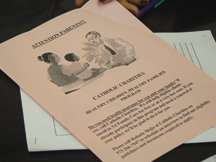According to Catholic Charities of the Archdiocese of Newark, thousands of families in Hudson County are eligible for free or low cost health insurance for their children and do not know it.
To help spread the word about NJ FamilyCare, a program that they say is underutilized throughout the state, the New Jersey Department of Human Services enlisted the help of some local non-profit organizations such as Catholic Charities to begin spreading the word about a year ago.
As part of that effort, Catholic Charities – which has one of their offices prominently located along Bergenline Avenue – launched the Healthy Children, Healthy Families project to inform clients about the NJ Family Care program, provide assistance with enrollment, and follow up for children and families.
“When it comes to outreach I think this is a very good way of doing this.” – Rafaela Mejia
________
‘Affordable’ but not welfare
On its website, NJ FamilyCare is careful to bill itself as “not a welfare program, but rather the State of New Jersey’s way of providing affordable health coverage for kids and certain low-income parents/guardians.”
The health insurance offered is provided at either no or low cost to families who do not have available or affordable employer insurance and cannot afford to pay the cost of private health insurance.
As of October, over 100,000 individuals in Hudson County were listed as enrollees – one of the highest amounts in the state, second only to Essex County which has just a fraction more participants.
In Hudson County, 74,555 children and 29,074 adults are enrolled in the program.
Although the enrollment is one of the highest in the state, there is apparently still work to do to reach the overall enrollment goal which, according to the NJ FamilyCare website, is to have all uninsured children enrolled in the program by January 2013.
A respectful environment
Bilingual Outreach Specialists from Catholic Charities work closely with the NJ FamilyCare office to help eligible families and children successfully enroll in this program and renew policies for those who are already enrolled in the program.
Rafaela Mejia, a specialist who works with Bergen and Essex counties and has recently been filling in to help in Hudson County, said that NJ Family Care has estimated approximately 40 to 50 percent of the individuals who could qualify for the program aren’t using it due to a lack of information, language barriers, and other issues.
To help combat those challenges, Mejia said her organization has circulated flyers throughout churches of all denominations in the area, visited food pantries, and attended various events to publicize the information.
So far, she said, the response has been incredible.
“You don’t realize how much poverty we have until you face it,” said Mejia.
Overall, she said the feedback from the Catholic Charities initiative has been positive, especially for those people who are wary of dealing with programs perceived as “social service.”
“They say they’re glad to come here because they are treated with respect,” said Mejia. “When it comes to outreach I think this is a very good way of doing this.”
State changes lower eligibility
Unfortunately, Mejia said that many of the calls she has received are from undocumented illegal immigrants and single people without children – both of which are ineligible for government funded program.
She’s also had a hard time qualifying parents for the program (though their kids are eligible), many of whom have recently lost their job and COBRA coverage and are only receiving unemployment as their form of income.
“That’s the saddest part,” said Mejia. “Because there’s nothing we can do for them.”
Although the NJ FamilyCare program might not be the right solution for those individuals, Mejia has made it a point to collect information and resources so she can direct those people to someplace where they can get some form of help.
And despite the efforts to increase enrollment, some changes made on a state level earlier this year have actually made it more difficult for certain people to qualify for the program.
According to the NJ FamilyCare website, “due to New Jersey’s current budget situation,” cuts were made to the program as of March 1 which affected coverage for parents and guardians.
Under the current system, parents and caretakers face much lower income eligibility levels, and immigrant parents/guardians who did not have legal permanent residence status for at least five years can no longer be enrolled in the program.
Determining eligibility
In addition to Catholic Charities, over 20 organizations, including North Hudson Community Action Corporation, Metropolitan Family Health Network, and the West New York Health Department are listed on NJ FamilyCare’s website as organizations which can help individuals with enrollment.
Applications can also be mailed directly to a home or they can be filled out online in 15 different languages – from Arabic to Vietnamese.
Links to other sites are also provided for those who may be outside of the eligibility requirements.
For further information about income requirements, eligibility and program cost, visit www.njfamilycare.org. For more information about the Healthy Children, Healthy Families initiative or any of the over 100 programs offered by Catholic Charities, visit www.ccannj.org, call (973) 266-7947 or email rmejia@ccannj.org.
Lana Rose Diaz can be reached at ldiaz@hudsonreporter.com.
